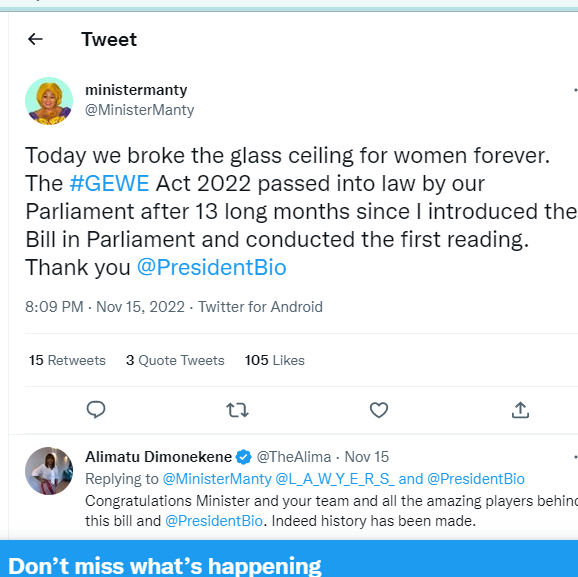By Lillian Okenwa
While Nigeria’s Federal Government has appealed the Federal High Court judgment which upheld the suit seeking enforcement of the National Gender Policy in Nigeria as a means of addressing discrimination against women in politics and governance, Sierra Leone has made history with its parliament unanimously passing a progressive “Gender Equality and Women’s Empowerment Act” that guarantees 30% of all public jobs will be held by women, 14 weeks maternity leave, financial inclusion, and other reforms!
Sierra Leone’s Minister of Gender and Children’s Affairs, Manty Tarawalli made the revelation on her Twitter page.

As the Sierra Leonean women rejoice, a Twitter user Islander Kabia remarked that girls and young people should not be left out of policies and systems.

In the suit filed by the Women in Politics Forum (WIPF) and a coalition of nine women groups, against the Federal Republic of Nigeria and the Attorney General of the Federation and Minister of Justice, seeking the mandatory implementation of National Gender Policy, Hon. Justice Donatus Okorowo of the Federal High held that the non-implementation of the National Gender Policy on 35% affirmative action on the appointment of women into political positions was a breach of women’s fundamental rights and dismissed the position of the Respondents.
The coalition of nine women groups comprises the Nigerian Women Trust Fund (NWTF), Women Empowerment and Legal Aid (WELA), Women in Politics Forum (WIPF), Centre for Democracy and Development (CDD- WEST AFRICA), Women Advocates Research and Documentation Centre (WARDC); Vision Spring Initiatives (VSI), YIAGA Africa, International Federation of Women Lawyers (FIDA) and 100 Women lobby group.
The applicants had argued that “The predominant appointment of men to decision-making positions, especially ministerial positions, with the exclusion of women is discriminatory against women and is in violation of sections 147 and 42 of the Nigerian constitution and article 19 of the African charter.”
The women through their counsel, Mrs Funmi Falana said that they were being discriminated against as a result of the belief that women were inferior to men.
She noted that the National Gender Policy (NGP) which provides that women should be allocated 35 per cent of all appointments, is being violated.
“Only seven of Nigeria’s 36 ministers are female. In the eyes of the law, 36 and 7 are not equivalent. Only four of the 37 members of the Federal Character Commission are women. This is ridiculous and insulting,” Mrs Falana had said.
She cited section 14(3) of the Nigerian Constitution to back her call for the enforcement of the NGP.
She noted that the provision mandates that the composition of the government of the federation or any of its agencies, and the conduct of its affairs shall reflect the federal character of Nigeria, promote national unity and also to command national loyalty.
The Nigerian government urged the court to strike out the suit but Justice Okorowo agreed with the applicants.
Unhappy with the verdict, the Nigerian government headed to the Abuja Division of the Court of Appeal seeking an order “setting aside the judgment; and striking out and/or dismissing the Respondents’ (women) suit in its entirety.”
The lawyers for Appellants (Federal Government and AGF; T. A. Gazali, SAN, T. D. Agbe, Suleiman Jibril, Ibukun Okoosi, Onyinye Halliday, O. D. Okoronkwo from Department of Civil Appeals Federal Ministry of Justice formulated 16 grounds of appeal for determination.
The government on one of its grounds submitted that: “The learned trial judge erred in law when he held that the Respondents’ suit was founded on enforcement of fundamental rights, and therefore disclosed a cause of action against the Appellants.
“Particulars Of Error: The Respondents’ suit was for the enforcement of the National gender policy. The National gender policy for 35% affirmative action on the appointment of women is not based on Chapter 4 of the Constitution. The National gender policy was a Federal Government policy which cannot be enforced by way of fundamental rights enforcement proceedings.
“The National gender policy was not made pursuant to any provision in Chapter 4 of the Constitution. The National gender policy has no bearing on the African Charter on Human and Peoples Rights Act. The Respondents’ suit was not commenced via the procedure provided under the Fundamental Rights Enforcement Procedure Rules, 2009.
“Failure to commence an action for the enforcement of fundamental rights under the appropriate procedure as provided by the Fundamental Rights Enforcement Procedure Rules, renders the entire proceedings null and void. The trial court having held that the Respondents’ suit borders on the enforcement of fundamental rights has invariably rendered the entire proceedings null and void as same was not commenced by way of the procedure provided under Order II Rule 2 & 3 of the Fundamental Rights Enforcement Procedure Rules.”
Hearing is yet to commence in the appeal which was filed on July 6, 2022.
